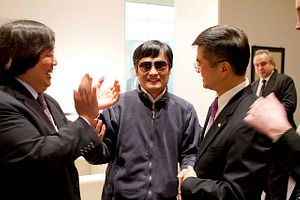The Rebalance authors Mercy Kuo and Angie Tang regularly engage subject-matter experts, policy practitioners, and strategic thinkers across the globe for their diverse insights into the U.S. rebalance to Asia. This conversation with Chen Guangcheng – author of The Barefoot Lawyer, Visiting Fellow at the Catholic University of America, Distinguished Senior Fellow in Human Rights at the Witherspoon Institute, and Senior Researcher at the Lantos Foundation for Human Rights – is the first in “The Rebalance Insight Series.”
In chapter 12 of your book The Barefoot Lawyer, you said: “My fate had now become a critical test case, watched by the world: could the Chinese government guarantee the rights of even a single Chinese citizen, and could the United States hold it accountable if it didn’t? Basic inviolable freedoms, like the ability to be together with my family, were presented by the Chinese government as if they were magnanimous concessions. American hearts might be in the right place, but what was needed now was an iron will to persevere and negotiate hard.” How would you evaluate the results of this “test case” from Chinese and American viewpoints?
Even though from the surface, it looks like the negotiations during the summit meetings [U.S.-China Strategic and Economic Dialogue, May 2012] of the two nations ended with the opportunity for me to come to the United States – for which I am very grateful – we must, however, also see that the promise China made to me, to the U.S., and to the world has not been fulfilled at all. Not only does my nephew Chen Kegui remain imprisoned, Guo Yushan and other friends who helped me after my escape, are also jailed in retaliation. Of course, when faced with human rights issues in real life, the U.S. and other democratic countries would often put special interests before morality and human rights. Therefore, the people must always be vigilant, even toward a democratically elected government in order to preserve the nation’s founding principles, such as the universal values of democracy and liberty.
How could the White House and former Secretary of State Hillary Clinton have negotiated more effectively on your behalf?
Uphold the American value belief in human rights. The Chinese Communist Party [CCP] had absolutely no reasons or excuses they could articulate in my case; the U.S. could, therefore, forthrightly demand that China would seriously and properly treat its own citizens by initiating an investigation in accordance with United Nations human rights conventions. This approach would comply fully with China’s insistence that the U.S. must not meddle with its internal affairs. It would be the right thing to do and would elicit the support of all those who embrace peace and justice as well as all the global powers of justice.
Will the rule of law and preservation of individual civil rights ever become a reality in China? If so, how?
Most definitely. We now live in an era of technological networks. Even though the Chinese government has sought to block all information, people are increasingly getting information from within and outside the country through various channels. This will greatly enhance our ability to provide the Chinese people with accurate and comprehensive analysis of our environment and demand. It is notable that for years China has spent more funding on national defense allocations to suppress its citizens in the name of maintaining stability, making more people aware of the pervasive perils wrought by autocratic rule. More and more people now dare to stand in defense of the rights of self and others. This indicates that the people’s self-awareness has already forged a firm foundation for Chinese realization of constitutionalism, democracy, and a civil society based on the rule of law. People have simply been enslaved for too long. Conquering fear still requires some time and implementation. As long as Chinese citizens fully participate, the power showdown between the state and people would see dramatic changes, paving the way for the end of Chinese dictatorship and the reality of a country governed by the rule of law and checks and balances will be fulfilled.
How can Chinese citizens help build civil society in China?
First, the Chinese people should overcome fear and dare say “no” to dictators. Persevere in the fight for universal values and our innate rights.
How might the next U.S. president constructively manage human rights issues in U.S.-China relations in the future?
[The next U.S. president] must steadfastly uphold America’s founding principles of democracy, liberty, and human rights and stand with the Chinese people, instead of just dealing with the CCP, with awareness that the autocratic rule of the CCP is due to be eliminated. Stand from a higher viewpoint and set the stage to welcome China’s reforms; building U.S.-China relations and not only U.S.-CCP relations. The presidency is not only about an election every four years or the goal to sit in office for eight years; it is not thinking about “seeking no accomplishments, but only to avoid blame” [according to a Chinese idiom].
Mercy A. Kuo is an advisory board member of CHINADebate and was previously director of the Southeast Asia Studies and Strategic Asia Programs at the National Bureau of Asian Research. Angie O. Tang is Senior Advisor of Asia Value Advisors, a leading venture philanthropy advisory firm based in Hong Kong.

































